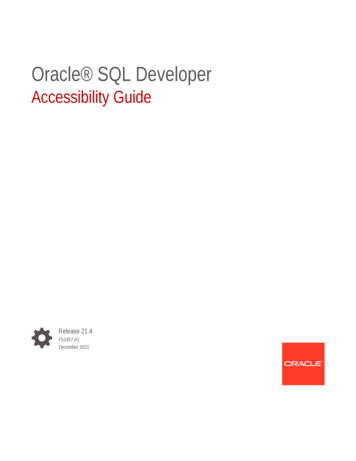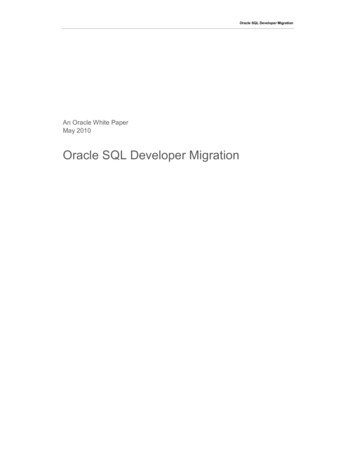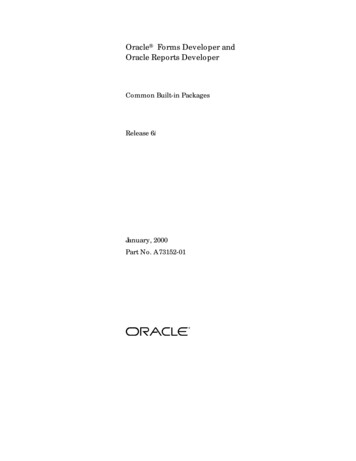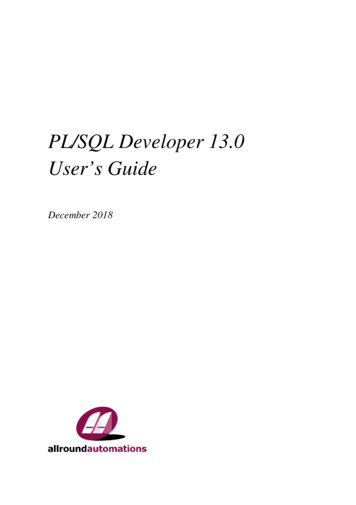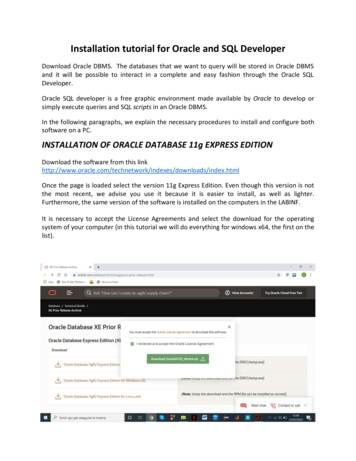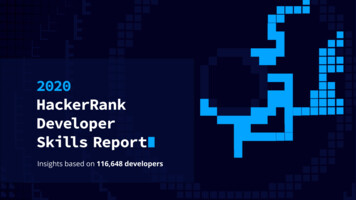
Transcription
2020HackerRankDeveloperSkills ReportInsights based on 116,648 developers
I N D E XI N T R OL E A R N I N GS K I L L ST O O L SW O R KINTROAt HackerRank, we have over 7 million developers in our community.To understand the state of developer skills in 2020, we’re launching our third annualThat’s over 25% of the world’s developers who are using HackerRankto level up their coding skills.Developer Skills Report: the largest survey of its kind ever released. We asked forinput on coding bootcamps, pay equity, and more—and over 116,000 developersfrom 162 countries responded. The data provides unparalleled insight into whatemployers and employees know, what they’re looking for in their work, and howthey see their roles evolving as technology sweeps across industries of all sizes.We’re fortunate to play a part in expanding and growing the developercommunity during this time of rapid change. Our mission at HackerRankis to help accelerate the world’s innovation as more and morecompanies shift to tech-focused approaches to running and buildingtheir businesses. Since 2010, 22 newcomers have entered the Fortune100—a seismic shift—driven largely by technical innovation. Since thattime, tech-first giants like Amazon, Google, and Facebook have joinedthe list, and they’re not slowing down.As companies evolve to embed tech into the heart of their products,the need for skilled talent is growing exponentially. To meet thatdemand, companies will have to become experts in developer hiring—not by relying on developers’ pedigrees or resumes, but by objectivelyevaluating their skills and placing them strategically throughout theorganizations they work for.I hope you enjoy our findings. Please feel free to tweet us @hackerrankor email us at research@hackerrank.com with comments or questions.Vivek RavisankarCo-founder & CEOHackerRank2020 HackerRank Developer Skills Report P.02
I N D E XI N T R OL E A R N I N GS K I L L SINDEXINTROTOOLSP.02LEARNINGT O O L SP.122020’s most widely known frameworksP.13Languages developers want to learnP.14Languages developers know vs. average salaryP.15Frameworks developers want to learnP.16Frameworks developers know vs. average salaryP.17The first language developers learned to code inP.04How developers learn new coding skillsP.05WORKAre managers hiring bootcamp grads?P.06Developer salaries across the worldP.18Hiring managers’ opinions on bootcamp grad skillsP.07Developer salaries in the USP.19Developer education level vs. employer company sizeP.08Developers on pay equityP.20The most important form of professional growthP.21The role developers want to have in 3 yearsP.22How developers spend their downtimeP.23METHODOLOGYP.24SKILLSW O R K2020’s most widely known languages2020’s most in-demand talent poolP.09Roles required to learn new skills most oftenP.10Languages hiring managers are looking forP.112020 HackerRank Developer Skills Report P.03
I N D E XW O R KT O O L S45.3%32.9%MillennialBASIC8.3%7.1%13.5%Gen X3.5%8.1%C 3.2%1.3%5.4%3.8%JavaGen Z12.6%16.0%14.5%C1.3%Today, the language is celebrated for its longevity, flexibility,and ease of use—just some of the reasons it’s still popularfor Gen Zers learning to code today.14.1%But that began to change in 1972, when Bell Labs invented C,allowing portability of the Unix operating system. Though it wasn’tan instant hit, the language rose to popularity in the late 70sand early 80s alongside the growth of Unix.7.1%Most Baby Boomers and Gen Xers—or, those between the agesof 40 and 74 in 2020—learned to code in BASIC. Developed foreducational use in 1964, BASIC was a popular instructionallanguage in college classrooms.30.5%Under the age of 39? Odds are that most of your peers learnedto code in C.What was the first language you learned to code in?39.5%For learning to code,C is overtaking BASIC10.7%S K I L L SL E A R N I N GI N T R OLEARNING & EDUCATIONPascalBaby Boomer2020 HackerRank Developer Skills Report P.04
I N D E XI N T R OL E A R N I N GS K I L L SLEARNING & EDUCATIONGen Z is utilizesbootcamps to learnnew skillsGen Z is more likely than any previous generation to learn coding skillsfrom bootcamps. Nearly one in six say they’ve leveraged bootcampsto learn new skills.On the flip side, they’re less likely to learn coding skills from oldergenerations’ go-tos, like books and on-the-job training. As Gen Zcomes to rely more heavily on non-traditional education sourceslike bootcamps, they’re poised to become a key talent 5%71.0%51.6%Gen ZMillennialCoding Bootcamps16.0%13.2%10.5%9.7%Gen XBaby BoomerFrom Peers or Mentors27.1%36.4%36.7%34.8%Developer Websites (e.g. GitHub)63.2%So which coding bootcamps are they turning to? Among respondents,the most commonly attended bootcamps were: CodeworksT O O L SHow do you learn new coding skills?59.3%66.9%65.6%63.9%Online Courses (e.g. edX)36.7%On-the-job Training AppAcademy Hack Reactor 46.3%63.1%68.4%W O R K Byte Academy2020 HackerRank Developer Skills Report P.05
I N D E XW O R KT O O L SS K I L L SL E A R N I N GI N T R OLEARNING & EDUCATIONNearly 1 in 3 hiringmanagers have hireda bootcamp gradHave you hired a developer that learned their coding skillsfrom a bootcamp?Not Sure 19.4%Yes 31.7%Hiring managers are bringing on bootcamp grads: 32% of them havehired a developer who learned their coding skills from a bootcamp.But not all hiring managers have tapped into this growing talent pool.Nearly half (49%) of hiring managers have never hired a bootcampgrad. Results were similar across all company sizes.As younger generations are increasingly drawn to bootcamps, thatmentality may have to change. Gen Z is more likely than previousgenerations to learn coding skills from a bootcamp, while bootcampattendance rates have risen 11x over the last decade. Combined, it’sa signal that bootcamp grads are slated to grow in number—and maygrow as a talent source as time goes on.No 48.9%2020 HackerRank Developer Skills Report P.06
I N D E XS K I L L SL E A R N I N GI N T R OLEARNING & EDUCATIONAnd hiring managersbelieve they’re wellsuited for the workHiring managers that bring on bootcamp grads reap the benefits.In fact: 72% of hiring managers that have hired a bootcamp grad feltthey were equally or better equipped for the job than other hires.According to managers, the top reasons bootcamp grads exceed are:Do you find bootcamp grads are better equippedfor the job than other hires?Same asOther Hires39.2%Yes 33.0% Ability to learn new technologies & languages quickly (71%) Strong practical experience (61%)W O R KT O O L S Eager to take on new responsibilities (52%)It’s a strong endorsement for this fast-growing form of codingeducation. While the first coding bootcamps emerged in 2011, theirpopularity has exploded over the course of the decade. A recent studycounted 20,000 bootcamp graduates in 2019 from 110 full-timeprograms—and that’s just in the United States (US) and Canada.No 27.8%2020 HackerRank Developer Skills Report P.07
I N D E XW O R KT O O L SIt’s a win for small companies, and should be seen as an opportunityfor larger companies to tap into a broader talent pool.69.0%59.9%59.7%22.5%22.0%17.2%Less than Bachelor's degree1-49 employees25.2%50.9%8.6%32% of developers at small companies (1-49 employees) haven’tobtained a Bachelor’s degree. It’s a stark contrast to large companies(10,000 employees); there, 91% of developers have obtaineda Bachelor’s degree or higher, while only 9% have not.14.9%Tech hiring giants like Google, Apple, and IBM have famously liftedtheir 4-year degree requirements. But for hiring developers withoutdegrees, it’s small companies that are leading the charge.What is the highest level of education you’ve completed?31.9%Small companiesare most likelyto hire developerswithout a degree18.4%S K I L L SL E A R N I N GI N T R OLEARNING & EDUCATIONBachelor’s degree50-999 employeesMaster’s degreeor Doctorate degree1,000-9,999 employees10,000 employees2020 HackerRank Developer Skills Report P.08
I N D E XI N T R OL E A R N I N GS K I L L SIN-DEMAND SKILLS2020’s most in-demandtalent pool: full-stackdevelopersT O O L S100%Across company sizes, hiring managers agree that full-stack developersare top priority: 38% of hiring managers say it’s the #1 role to fill in 2020.Back-end developers and data scientists were ranked second and thirdpriorities, s10,000 employeesTotal17.8%20.1%14.8%The emphasis on full-stack developers was most pronounced in smallcompanies (1-49 employees), 43% of which ranked the role as theirtop priority.Though the qualities that define a “full-stack developer” are a subjectW O R KWhat’s the most important role you’re looking to fill in 2020?of debate, most agree that they should have a basic understanding(or better) of all layers of a tech stack, and should be able to generatea minimum viable product on their own. It’s why they’re especiallyimportant in small organizations, where fewer employees often haveto do the job of many.043.4%1-49 employees 50-999 employeesFull-stack developerBack-end developerFront-end developerDevOps engineerData scientistQA engineer2020 HackerRank Developer Skills Report P.09
Full-stackdeveloperFront-enddeveloperYes, a new languageDatascientistYes, a new platform/frameworkDevOpsengineer25.8 %46.6 %39.7 %33.4 %39.8 %33.1 %28.2 %Back-enddeveloper45.1 %41.4 %53.0 %21.9 %Full-stack developers also have to learn the most languages:45% reported that they had to pick up a new one within the last year.Their peers have to learn more about theoretical concepts;data scientists and DevOps engineers were required to learn newconcepts most often (33%).With expertise that spans front-end, back-end, and more (dependingon whom you ask), full-stack developers have one of the morenebulous job descriptions in the technical world. The relativeflexibility of their role—and the breadth of technologies they haveto keep up on as a result—means learning on the job never stops.38.3 %49.3 %36.1 %27.3 %Full-stack developers may be in highest demand, but their roleis also one of the most professionally demanding. 60% of full-stackdevelopers were required to learn a completely new frameworkor platform in the last year—more than any other role polled.56.9 %Did your job require you to learn a new technicalskill in the last year?59.7 %Full-stack developersare required to learnnew skills most often45.4 %I N D E XI N T R OL E A R N I N GS K I L L ST O O L SW O R KIN-DEMAND SKILLSQAengineerYes, a new theoretical concept2020 HackerRank Developer Skills Report P.10
I N D E XT O O L SS K I L L SL E A R N I N GI N T R OIN-DEMAND SKILLS1 in 5 hiring managersin the Americas arelanguage agnosticwhen seeking new hiresGlobally, JavaScript is the most popular language hiring managerslook for in a candidate. But not all hiring managers see languageskills as a top priority: globally, 14% say they’re language agnosticwhen screening candidates.This trend is most pronounced in the Americas region (AMER):21% of hiring managers in the region are language agnosticwhen searching for new hires. Asia-Pacific region (APAC) hiringmanagers are half as likely to be language agnostic (10%).What language skills do you look for when hiring %17.2%17.5%20.9%C 17.0%15.0%16.8%19.5%14.3%Language AgnosticW O R 0.5%2020 HackerRank Developer Skills Report P.11
I N D E XI N T R OL E A R N I N GDEVELOPER TOOLSJavaScript is this year’smost widely knownlanguage (again)W O R KT O O L SS K I L L SIn terms of most known languages, little has changed over the last threeyears. In fact, the top 10 languages saw only two changes from last year:C# and PHP switched between sixth and seventh position.It’s worth noting that the best known language, JavaScript, isn’ta language most developers learn to code in—only 5% of respondentsreported it as their first programming language. Java follows a similarpattern: it’s the second best known language overall, yet only 13%of developers say it was their first language learned.Best known languages: n445C 554C#676PHP767TypeScript888Pascal999R1010102020 HackerRank Developer Skills Report P.12
I N D E XI N T R OL E A R N I N GS K I L L ST O O L SW O R KDEVELOPER TOOLSDjango and Vue.jsare rising steadilyThis year, the framework landscape was as dynamic as last year, with fivetotal changes across the top 10.Since our first Developer Skills Survey, Vue.js, has shown steady growth,rising one spot per year since 2018. But the most dramatic change was forDjango, which moved up two spots between 2019 and 2020 (rising fromsixth to fourth most popular).Django’s lift in usage is inextricably linked to the rise of Python. A popularchoice for machine learning and artificial intelligence (AI), Python saw anuptick in usage in 2019, and has consistently been ranked as one of the toplanguages that developers want to learn year over year. And since Django isa Python-based framework, it’s natural that Django would rise alongside it.Best known frameworks: by on Rails988JSF101092020 HackerRank Developer Skills Report P.13
I N D E XI N T R OL E A R N I N GS K I L L SDEVELOPER TOOLSGo is the #1 languagedevelopers wantto learnFor the third year running, Go is the #1 language developers wantto learn Scala18.7%Swift16.7%Rust16.3%RubyDeveloped by Google, Go has seen increasing popularity sinceits invention in 2009, due in part to the visibility of its creators.As we noted in our 2018 report, it’s not the first time tech giantslike Google have driven language adoption: Twitter similarlyboosted Scala when it outgrew Ruby on Rails, as Apple did for Swiftwhen it moved away from Objective-C.15.9%15.0%C#13.5%Haskell12.0%C l7.9%Prolog7.7%Stan7.5%PascalCW O R K36.2%JavaScriptAnd slowly but surely, developers are learning Go. It inched upto the 12th best known language for 2020, up from 13th in 2018.T O O L SWhat languages do you plan on learning next?6.6%6.0%2020 HackerRank Developer Skills Report P.14
I N D E XT O O L SS K I L L SL E A R N I N GI N T R ODEVELOPER TOOLSThose that know Perlmake 54% more thanthe average developerPerl is the language most closely associated with above-averagepay. Globally, developers that know Perl make 54% more thanthe average annual developer salary. It’s followed by Scala ( 42%),and Go ( 33%).The high pay association with languages like Perl, Scala, and Gois due in part to the demographic that knows them. For example,about 10% of senior developers polled knew Perl—but only 2%of junior developers did. Scala and Go showed similar patterns.And since senior developers tend to earn higher salaries,the average salary associated with each language is elevated.Salary increase based on languages knownOver global average salary ( 54,491 USD) 41.6%Scala 33.4%Go 32.3%Ruby 22.4%Objective-C 19.6%Swift 15.2%Pascal 13.1%R 11.3%Prolog 7.3%C# 6.8%KotlinTypescriptPythonJavaScriptC W O R K 54.2%Perl 5.4% 4.0% 2.2% 1.6%2020 HackerRank Developer Skills Report P.15
I N D E XT O O L SS K I L L SL E A R N I N GI N T R ODEVELOPER TOOLSDevelopers are learningReact, AngularJS,and DjangoWhich frameworks do you plan on learning next?React is the framework most developers want to learn—32% sayit’s the framework they’re learning next.Ruby on RailsAngularJS and Django round out the top 3: 28% say they planto learn AngularJS, and 26% say they’re learning Django. All threeframeworks are in the top five that hiring managers ackbone.jsLast year, we noted that an increasing number of developers wereplanning to learn React—and that as a result, it had a chance tobecome the best known framework in 2020. But in this year’s survey,React’s position remained static as the second best-known r8.1%Pyramid8.0%JSFPadrinoW O R K32.3%React7.4%7.1%2020 HackerRank Developer Skills Report P.16
I N D E XI N T R OL E A R N I N GS K I L L ST O O L SDEVELOPER TOOLSBut globally,Backbone.js is associatedwith the highest payBackbone.js is the framework associated with the highest pay:developers that know it earn 49% more than the global average.Cocoa and Ruby on Rails were linked to the second and third highestaverage salaries. Those that know Cocoa earn 35% more thanthe global average, whereas those that know Ruby on Rails earn30% more than the global average.Again, the association with higher pay is tied in part to seniority.Take, for example, Backbone.js. 7% of senior developers know it,compared to only 2% of junior developers. And since seniordevelopers earn higher pay, it could elevate the average pay linkedto the framework.It’s worth noting that Backbone.js is also an uncommon skill—globally, only 4% of developers know it. So the low knowledge supplymay allow those that know it to demand higher pay.Salary increase based on frameworks knownOver global average salary ( 54,491 USD) 34.6%CocoaRuby on Rails 29.6%Spark 29.4% 19.3%Struts 10.7%.NETCore 8.7%React 7.4%ASP 6.3%Vue.jsAngular JSJSF 3.7% 2.2%Spring 1.2%Django 1.0%ExpressJSW O R K 48.7%Backbone.js 0.1%2020 HackerRank Developer Skills Report P.17
I N D E XI N T R OL E A R N I N GS K I L L ST O O L SDEVELOPERS AT WORKUS developers makemore than those in anyother countryWhat is your current salary? 88,539Australia 72,771Canada 68,194Netherlands 65,388United Kingdom 64,088GermanyAveraged across all job roles and levels, US developers are paid themost: developers there make 109,167 annually on average.Australia and Canada were the next highest paying countries, withaverage developer salaries of 88,539 and 72,771, respectively. TheNetherlands and the United Kingdom rounded out the top five highestpaying countries.South Africa 45,990Indonesia 45,269Spain 44,038Ukraine 43,600Argentina 42,442Colombia 41,818Turkey 41,758Mexico 41,392Brazil 40,876Poland 40,420Italy 39,716Romania 39,641Russia 39,256Pakistan 39,154IndiaBangladeshNigeriaW O R K 109,167United StatesGlobal Average Salary: 54,491 (USD) 38,229 35,096 33,5822020 HackerRank Developer Skills Report P.18
I N D E XI N T R ODEVELOPERS AT WORKThe west is the highestpaying region in the USAverage developer salary by US metro area 147,948San Francisco 134,539Seattle 129,080S K I L L SL E A R N I N GLos AngelesTaking a closer look at the US, western cities take the cakefor highest developer salaries. Cities in the west have the highestpay (with an average salary of 128,198), while the northeast comesin second (with an average salary of about 112,871).High salaries in the west region are led by coastal tech talentmagnets like San Francisco ( 147,948), Seattle ( 134,539),and Los Angeles ( 129,080), which make up the three highestpaying cities in the region. And in the northeast, Boston ( 116,804)and New York ( 115,792) pay the highest salaries. 113,820Chicago 109,562San Diego 107,903Portland 107,432Salt Lake City 106,293Washington D.C. 105,967 104,803Atlanta 101,095Denver Northeast Average: 112,871T O O L S 115,792New YorkAustin West Average: 128,198 Midwest Average: 100,711 South Average: 98,986Philadelphia 97,343Dallas 96,641Minneapolis/St. PaulPhoenixDetroitRaleighMiamiW O R K 116,804Boston 90,882 88,437 86,046 83,125 79,5832020 HackerRank Developer Skills Report P.19
I N D E XI N T R OL E A R N I N GS K I L L ST O O L SW O R KDEVELOPERS AT WORKGlobally, 39% ofdevelopers feelthey’re paid unfairlyDo you believe you’re being paid fairly compared to your peers?Not Sure 26.0%Yes 34.9%Only 35% of developers believe they’re being paid fairly. On the flipside, 39% believe they’re being paid unfairly compared to peers,and 26% just aren’t sure.As sharing salaries has become the norm through websites likeGlassdoor and LinkedIn, developers have gained unprecedentedaccess to peer salary estimates. In many ways, that shift is a positiveone; it gives developers the ammo they need to negotiate pay alignedwith their fair market value. But it also means developers are moreaware when their pay differs from that of their peer group.No 39.1%2020 HackerRank Developer Skills Report P.20
I N D E XS K I L L SL E A R N I N GI N T R ODEVELOPERS AT WORKThe most importantform of professionalgrowth: new tech skillsLast year, we learned that competitive compensation is the #3criteria developers look for in a job—but professional growthand learning is #1. This year, we asked developers to definethe form of professional growth that’s most important to them.What form of professional growth is most important to you?2.3%13.9%24.9%59.0%Most developers agree: they want opportunities to learn newtechnical skills on the job. A whopping 59% of developers ranked itas the most important form of professional growth.T O O L SIt was twice as important as the ability to take on new responsibilities,and more than 4x more important than chances to develop soft skills.Opportunity to learn new technical skills at workAbility to take on more responsibilities & receive promotions at workW O R KOpportunities to develop soft skills2020 HackerRank Developer Skills Report P.21
I N D E XWhat role do you want to have in three years?W O R KT O O L SOn the flip side, developers currently acting as managers and technical leadswere pleased with their current roles. Most wanted to stay in the same roledown the line.Want to be aTechnical LeadWant to be anIndividualContributorIndividual ContributorsWant to be anEngineeringManagerTechnical Leads6.5%7.5%3.8%15.3%6.0%19.1%30.4%39.9%4.5%S K I L L S62% of developers in individual contributor roles want to become a technicallead in the next three years. That’s a stark contrast to the number that wantto become managers (15%).It may be part of why most developers prioritize learning new tech skillswhen it comes to professional growth (versus taking on more responsibilityor soft skills advancement, for example). Most are less interested inmanaging people, and more interested in filling a technical lead role, like aprincipal architect—so picking up new technical skills is paramount.47.6%57.6%Individual contributorswant to be tech leads,not managers61.8%L E A R N I N GI N T R ODEVELOPERS AT WORKOtherEngineering Managers2020 HackerRank Developer Skills Report P.22
I N D E XI N T R OL E A R N I N GS K I L L SDEVELOPERS AT WORKDevelopers spenddowntime listeningto music and surfingthe webWhen they’re not coding, most developers spend theirtime listening to music (61%).Surfing the web (52%), getting something to eat or drink(48%), and exercising (48%) were also popular optionsfor a quick time out. But 3% of developers say they nevertake a break!What do you do to take a break from coding?61.0%Listen to Music52.0%Surf the WebEat or Drink Something48.2%Exercise / Go for a Walk47.6%Check Social Media40.8%Watch Videos40.2%37.3%Talk to a Co-Worker31.2%ReadPlay Video Games27.7%Text or Call Someone27.5%20.2%Take a Nap10.5%T O O L SMeditatePlay Ping Pong/Pool/Foosball8.7%Spend Time With my Pet(s)8.3%Never Take a Break from CodingW O R KOther2.8%4.4%2020 HackerRank Developer Skills Report P.23
I N D E XI N T R OL E A R N I N GMethodologyHackerRank conducted its third annual developer skills survey to identify trends in thedeveloper community. A total of 116,648 developers and students responded to the15-minute online survey from November 12 to December 11, 2019. The survey wasprogrammed in SurveyMonkey and HackerRank recruited respondents via email(community members, customers, and prospects) and through social media sites.Respondents came from 162 countries. Results were analyzed using Q Research. Testsof significant differences were conducted at the .05 level (95% probability that the differenceis real, not by chance). Percentages may not always add to 100% due to rounding.S K I L L SUS region definitions (based on US Census Bureau method): Midwest: Chicago, Minneapolis/St. Paul, Detroit Northeast: Boston, New York, Philadelphia South: Austin, Atlanta, Miami, Dallas, Raleigh, Miami, Washington D.C. West: San Francisco, Seattle, Los Angeles, San Diego, Portland, Salt LakeCity, Denver, PhoenixW O R KT O O L SGeneration definitions (based on Pew Research ranges): Gen Z: Born 1997-2012 Millennial: Born 1981-1996 Gen X: Born 1965-1980 Baby Boomer: Born 1946-1964Global region definitions: Americas (AMER): Antigua and Barbuda, Argentina, Bahamas, Barbados, Belize, Bolivia,Brazil, Canada, Chile, Colombia, Costa Rica, Cuba, Dominican Republic, Ecuador, ElSalvador, Guatemala, Haiti, Honduras, Jamaica, Mexico, Nicaragua, Panama, Paraguay,Peru, Trinidad and Tobago, United States, Uruguay, Venezuela Asia-Pacific (APAC): Afghanistan, Australia, Azerbaijan, Bangladesh, Bhutan, Brunei,Cambodia, China, Fiji, Georgia, India, Indonesia, Japan, Kazakhstan, Kiribati, Kyrgyzstan,Maldives, Malaysia, Mauritania, Mongolia, Myanmar, Nepal, New Zealand, Pakistan,Philippines, Singapore, South Korea, Sri Lanka, Taiwan, Thailand, Turkmenistan,Uzbekistan, Vietnam, Tajikstan Europe, Middle East, & Africa (EMEA): Albania, Algeria, Andorra, Angola, Armenia,Austria, Bahrain, Belarus, Belgium, Benin, Bosnia and Herzegovina, Botswana, Bulgaria,Burkina Faso, Burundi, Cabo Verde, Cameroon, Congo, Croatia, Cyprus, Czech Republic,Denmark, Egypt, Equatorial Guinea, Eritrea, Estonia, Ethiopia, Finland, France, Gabon,Gambia, Germany, Ghana, Greece, Holy See, Hungary, Iceland, Iran, Iraq, Ireland, Israel,Italy, Jordan, Kenya, Kuwait, Latvia, Lebanon, Lesotho, Libya, Lithuania, Luxembourg,Macedonia, Madagascar, Malawi, Malta, Mauritius, Moldova, Montenegro, Morocco,Mozambique, Namibia, Netherlands, Niger, Nigeria, Norway, Oman, Palestine, Poland,Portugal, Qatar, Romania, Russia, Rwanda, San Marino, Saudi Arabia, Serbia, Seychelles,Sierra Leone, Slovakia, Slovenia, Somalia, South Africa, Spain, Sudan, Swaziland, Sweden,Switzerland, Syria, Tanzania, Togo, Tunisia, Turkey, Uganda, Ukraine, United ArabEmirates, United Kingdom, Yemen, Zambia, Zimbabwe, Mali2020 HackerRank Developer Skills Report P.24
I N D E XI N T R OFOR DEVELOPERSCode & Get HiredMore ResearchJoin over 7 million developers,L E A R N I N Gimprove your coding skills, andfind the best job.Sign Up & CodeS K I L L SFOR WORKHire TalentHackerRank is the leadingW O R KT O O L Send-to-end technical recruitingplatform for hiring developers.Get in Touchresearch@hackerrank.com www.hackerrank.comUSA: 1-415-900-4023 India: 91-888-081-1222 UK: 44-208-004-0258Learn More2020 HackerRank Developer Skills Report P.25
Gen Z is more likely than any previous generation to learn coding skills from bootcamps. Nearly one in six say they've leveraged bootcamps to learn new skills. On the flip side, they're less likely to learn coding skills from older generations' go-tos, like books and on-the-job training. As Gen Z




